- Home
- Madeleine L'engle
The Young Unicorns Page 6
The Young Unicorns Read online
Page 6
Emily listened quietly, seriously, with the intent expression with which she listened to music. Dave lurched out of the black leather chair, started to speak, clamped his jaw tight shut, shoved his hands into his pockets, and paced.
“Dave,” Vicky said, “you look like them, walking up and down that way—the boys who made the man leave so suddenly.”
“Nobody ever pretended I was all sweetness and light. I’m an ex-hood. Remember that. And the Englishman was quite right. You were an idiot to have told him.”
“He didn’t say I shouldn’t have told him. He said not to tell anybody else.”
Emily asked, “Did he touch you—I mean, did he shake hands or anything?”
“No.”
“That would have been important. You can tell a lot from shaking a person’s hand.”
“I can’t tell as much as you can.”
“I know, but you can still tell something. I used to, even before.”
“Now listen, Vicky,” Dave said, “we know you have a great imagination and all that …”
“No,” Vicky said vaguely, instead of getting angry. “That’s not it, Dave. It was all right to talk to him. I have a feeling. That’s all.”
“Vicky,” he said heavily, “aren’t you old enough yet to know that you can’t go around trusting feeling? You can’t go around trusting people. Not anybody. Not in New York City. Not today.”
“As Papa would murmur,” Emily said, “it’s a naughty world. Listen, Vicky, did you tell him you recognized him?”
“No.”
“Then he’d have thought you were just talking about the genie to a stranger, any stranger, wouldn’t he?”
“Why’d you shut up about that?” Dave asked. “You seem to have told him everything else.”
Vicky silently pulled off her gloves and shoved them into one pocket, yanked off her red beret and stuck it in the other, then went out into the hall and hung her coat up on one of the pegs. “I’d better let Mother know I’m home,” she said stiffly.
Five
Dave frequently stayed for dinner with the Austins, but he was so annoyed at Vicky’s indiscretion that as soon as he finished reading to Emily he left. He walked rapidly, jingling his keys. Dean de Henares knew that he had a gate key to the Cathedral Close; even though his choirboy days were almost four years behind him he was still considered by the Cathedral Chapter as one of the family, particularly since his father was on the Cathedral maintenance staff. What neither the Dean nor any of the Canons knew was that Dave had managed to collect keys to every gate and door on the Close. He himself did not know quite why they were so important to him, or why they gave him a sense of security.
He hurried in through the front gate, head down against the wind that was rising and dispersing the fog. The wind was never, in any event, as heavy a few blocks inland as it was down by the river. To his left the west towers of the great building raised themselves into an evening sky that had the pinkish tinge that always stains the night when clouds are low over the city. Light, stretching from one end of the spectrum to the other, shone through the slender lancets of the Octagon; the twenty-four delicate flying buttresses were visible and living bones shaping and defining the pulsing color.
Around the Close, light fell in warm yellow pools from the lamps scattered about the grounds, illumining the bare branches of trees and shrubs. Dave had been around the Cathedral most of his life, and the beauty was so everyday a part of his comings and goings that he seldom noticed or acknowledged it. He was in a hurry to get back to the cluttered room which he shared with his father, so he broke into a half trot, veered aside to avoid a man who was heading towards Cathedral House, walking the Dean’s large brindle bulldog.
Brindle bull—
Hadn’t that idiot Vicky said that the man in the park had been with a bulldog?
Dave looked up, into the man’s face.
How many men can there logically be in New York with no eyebrows and who walk bulldogs—
“What are you doing with the Dean’s dog?” Dave demanded.
At this piece of rudeness the man stopped, an alert and slightly startled expression on his pleasant face. “Walking him home.”
“Sorry,” Dave said, “but—” He paused, looking at the man, who was certainly no tramp. His dark coat was conservatively well cut, his hat—not fur, this time—definitely English. “It’s just that I’m around the Cathedral a lot and I haven’t seen you before and we do get some pretty peculiar characters wandering through the Close.”
“Do you think Cyprian would take up with a peculiar character? Not, of course, that I’m denying that I may be one. You’re Josiah Davidson, aren’t you?”
“What makes you think so?” Dave asked, anger, suspicion, wariness all mingling in his voice.
“You look very much as you were described to me.”
“Why would anybody bother to describe me to you?”
“A mutual friend of ours, Mr. Theotocopoulos.”
Dave reacted with rage that equaled Mr. Theo’s in passion but revealed itself in the opposite manner: his voice was quiet, coldly courteous. “I don’t understand. Some friends of mine happened to describe you to Mr. Theo quite accurately, and he didn’t mention knowing you. I think you owe us an explanation.”
The man’s voice was equally cool. “Whether or not I owe you anything, or what I owe you, is open to debate. And who are these friends of yours and why were they describing me? I think you’d better come into the Deanery and have a cup of tea with me.”
Dave realized that he had been almost as indiscreet with the Englishman as had Vicky; he hunched into his jacket and followed up the path to Cathedral House, a grey stone building in the center of the Close. It housed the Cathedral offices and the Dean’s living quarters. Cyprian ambled along contentedly, undisturbed by the tension in the air, preferring to sniff and snuff at the bushes to going indoors.
“Cyprian!” the Englishman ordered, and the ferocious-looking beast gave an apologetic sneeze and heeled.
The man had a key to Cathedral House, though he rang the Dean’s bell before putting the key in the lock. The Cathedral offices closed at five for the night, and the receptionist’s desk was empty, the doors to the Canons’ offices shut. He led Dave upstairs. They went into the small library which took the overflow of books from the Dean’s much larger study. A fire was laid, and the rather repulsive-looking remains of what had once been a shaggy red rug lay on the hearthstone; Cyprian, wheezing, turned around on it three times, scrabbling it up into an uncomfortable lump onto which he lowered himself with contented gruntings.
The Englishman struck a match and lit the fire. “All right, now, Josiah Davidson, sit down and make yourself at home. I’m Canon Tallis, by the way.” He removed his hat and tossed it on a chair by the door on top of the heavy, monklike habit the Dean wore out of doors. It had been given him by a Russian archbishop, and was conspicuous only for its complete simplicity.
Dave stared at the shiny bald pate of the Englishman who seemed so at home in the Dean’s apartment. “Sorry, but there doesn’t happen to be a Canon here by that name.”
“Quite. I’m lately from the diocese of Gibraltar, am now with St. Paul’s in London, and am presently visiting Dean de Henares, who should be in at any moment with our tea.” He went to the doorway and called, “Juan, put on another cup. We have company.”
Juan was the Dean’s first name. Dave felt an inexplicable resentment at the bald Englishman’s familiarity.
“Do sit down, Dave,” Canon Tallis said. “You are called Dave, aren’t you? By everyone except Mr. Theotocopoulos, that is.”
Dave grunted in assent, mumbling something about the indignity of being called Josiah.
“But the first Josiah was a rather great king,” the Canon said, looking directly at him, “who remained faithful even when his father and his sons and many of his people turned away and worshipped false gods. Theo is right,” he added, as though to himself. “You do remind one of
the Dean.”
Dave took a straight chair between two chintz-draperied windows and sat, unrelaxed, watchful. The room had the pleasant odor of old books, furniture polish, burning applewood from the fire. Over the mantlepiece was a portrait of the Dean when he was much younger than in Dave’s remembrance, swarthy and darkly handsome, with a fiery vitality. Dave glared at it, refusing to acknowledge any resemblance.
He rose as the Dean loomed in the doorway, carrying a heavily laden wicker tray. “Hi, Dave,” he boomed.
Dave took the load from him, saying, “Hi, Mr. Dean,” in return as he put the tray down on a long marble table in front of the fire. The Dean seated himself and lifted an enormous chintz tea cozy from a chipped earthenware teapot, incongruous in the midst of a handsome silver tea service,. There were eggs in china cups, a plate of muffins dripping with butter, and a raisin cake. Dave felt his mouth watering. This would keep him from worrying about dinner when he got home. His father’s cooking consisted of stringy and waterless stew, alternating with canned baked beans, and it had not yet occurred to the boy that he himself might vary this menu.
The Dean poured tea, gave Dave an egg and three muffins, and served the Canon, laughing as he gave him only half a muffin. He himself sat back, sipping at a cup of strong tea with neither milk nor sugar. He was a big man and heavy, too heavy, not, Dave knew, because of any desire to overindulge in food, but because he was invited frequently in for meals or ‘just a bite of this, Dean, I know it’s one of your favorites,’ as he walked the crowded streets around the Cathedral. He was a familiar figure in the area in his monklike garb and grizzled hair, and much loved.
“Dave,” Canon Tallis said, “with the Dean’s permission I would like to ask you some questions.”
Dave looked over at the Dean, who nodded, saying in his strongly individual accent, the speech of a highly educated man which still retained traces of Spanish rhythm: “I asked Canon Tallis to come stay with me, Dave, because I need his help. So I would appreciate it if you’d give him your full cooperation.”
Dave nodded in silent assent. If there were three people in the world he came close to trusting, they were Mr. Theo; Juan de Henares, the Dean of the Cathedral; and Norbert Fall, the Bishop.
Canon Tallis sat back comfortably, drinking his tea. “How long have you known the Dean, Dave?”
“Since I was about eight, when I started in the Cathedral School.”
“How did that happen?”
“My father’s on the maintenance staff here. He’s a carpenter.”
“And a superb craftsman, if sometimes a difficult man,” the Dean said. “Dave’s mother was seldom around, and she died when he was six. When he was little he used to wander around the grounds and the shop after school. One day Theo heard him singing and grabbed him for the choir. He had one of the loveliest soprano voices we’ve ever had, though that’s hard to realize now, isn’t it, Dave? What are you? Bass?”
“Baritone, sir.”
“I’ve come to know Dave better than I do many of the choristers,” the Dean said to Canon Tallis, “though there are always a few in each class who are close to me. But Dave’s relationship to the Cathedral through his father, his battles with Theo, and his own somewhat obtrusive personality have combined to bring him more than is usual to my attention.”
The Canon laughed. “Now, Dave, forgive me if I remind you of something you’d rather forget: about the time your voice was changing, your last year in choir, you began to run with an unsavory group known by the somewhat self-conscious name of the Alphabats.”
“Who told you?” Dave demanded, glaring at the Canon, and looking suspiciously at the Dean.
The Dean put two large pieces of cake on Dave’s plate. “You remember that I was born in Puerto Rico. I was twelve when we came to New York. We lived on 127th Street, and my gang was called Los lobos.”
Dave took a few moments to digest this information. He was surprised and unexpectedly shocked, he who prided himself on his unshockability. The fame, or ill-fame, of the Spanish Wolves was still remembered on the streets of New York. “I don’t run with any gang.”
“But you did,” Canon Tallis said.
“People don’t let you forget anything, do they? You do something stupid and it labels you for the rest of your life.”
“Has it labeled the Dean?” Canon Tallis asked.
The Dean’s spontaneous laugh warmed the room. “A certain monk, Peter by name, said—and I think I quote him accurately; correct me if I’m wrong, Tom—” He grinned at Canon Tallis. “‘The world is passing through troubled times. The young people of today think of nothing but themselves. They have no reverence for parents or old age. They talk as if they knew everything, and what passes as wisdom with us is foolishness with them. As for the girls, they are foolish and immodest in speech, behavior, and dress.’”
“Okay, then.” Dave, with his rebellious eyes, did indeed resemble the portrait of the Dean. “That’s the way it is, stuff like that. People labeling you. Like when I was at the Cathedral School. It wasn’t the other kids, it was the masters. They never let me forget that my father was a drunk who snarled if anybody spoke to him, and they expected me to be a hood.”
“Did they, Dave?” the Dean asked. “That is to their shame. I wish I had known.”
“Not all of them,” Dave said with grudging honesty. “But enough. It was their feeling and talking at me like your Peter the Monk that made me go to the Alphabats. Listen, Mr. Dean, kids aren’t any worse today than they ever used to be. So why do people talk about us like that?”
“Peter the Monk wrote that around 1274,” the Dean said. “Sorry, Dave. Didn’t mean to trap you. Just wanted to make a point.”
Dave gave his shrug. He was not amused.
Canon Tallis handed him the plate with the last of the muffins, removed the cozy from the teapot, and poured him fresh tea. “I presented the Dean with this monstrosity. It does serve to keep the tea hot. Where are you in school now, Dave?”
“I’m a senior at trade school.”
“And your trade?”
“Electronics.”
“Mr. Theo says you also play the English horn.”
Dave shrugged.
“And you could, if you wished, have had a scholarship to St. Andrews?”
“It made more sense for me to learn a trade,” Dave said.
“But you know a lot of the students at St. Andrews?”
“Some. I read Emily Gregory her lessons. She’s a blind kid. Mr. Theo teaches her, and he talked me into it.”
“You pick her up after school?”
“If she doesn’t come home with the Austins.”
“The Austins are the family who live above the Gregorys and look after Emily?”
“Yes. I suppose Mr. Theo told you all this?”
“Most of it.”
“Canon Tallis,” Dave demanded, “when Suzy and Rob Austin described you at dinner, why didn’t Mr. Theo let on he knew you and who you were and everything?”
“Because he wasn’t sure,” the Canon answered. “I came rather precipitously—”
“As is your wont,” the Dean interrupted.
“Whose fault was it this time? I’d only arrived the day that I saw the two young Austins and Emily Gregory with the genie. Very good, Dave, I did learn who they were because Mr. Theo told me. That night after he’d had dinner with you and Emily and the Austins he dropped in to see the Dean on his way home to see if I were really here. I may say that he treated me to one of his more spectacular displays of rage because I hadn’t informed him of my presence and he’d learned about it secondhand at the Austin dinner table. I do enjoy his fits of fury. We’ve been friends, by the way, for years. I knew him in Paris before he came here to the Cathedral, and it was he who introduced me to the Dean. Now, Dave, back to the Alphabats. Are you still in touch with them?”
Dave shrugged again. “Not any more than I can help. I see them around, but I don’t have anything to do with them.”
“No. And I don’t want to know.”
“Or who their leader is?”
“Nope.”
“I suppose it’s come to your attention that they’re more tightly organized than they used to be? And there are more of them?”
“Listen, Canon Tallis,” Dave said with fierce control, “I told you I’m through with them. I don’t want any more to do with them. I don’t want to talk about them.”
“I think you’d better,” the Dean said. “They may not be through with you. You’d better know that there is a strong leader now, and nobody knows who he is, and we want to know, Dave, it’s important that we know. It’s no longer the boy called by the letter A. It’s somebody outside the gang. The leaders within the gang still use the letters of the alphabet, in order of precedence—you were E once, weren’t you?—but they’re being directed by someone on the outside, someone we would guess to be considerably older. Perhaps it would help us if you were to talk with some of them if the opportunity comes your way. How about it?”
“Why?” Dave asked.
“Because they’re no longer just a gang, Dave, and I must have more information about them. Will you help?”
Dave gave an angry sigh. “I don’t know. Maybe. I’ll try.”
“You’ll have to trust me when I tell you that it’s urgent. Will you?”
Dave looked over at the Dean’s bulk, emphasized by his black cassock belted loosely around his thick waist. He said somberly, “I only know one thing. You can’t trust any human being. Not anyone.”
“Factually,” Canon Tallis said, “that is a perfectly accurate statement. However, we cannot live without trusting people.”
“I can.”
“Can you? You can exist, perhaps. And how do we become trustworthy? Only by being trusted. What about your relationship with Emily Gregory? Doesn’t the fact that she trusts you make a difference?”

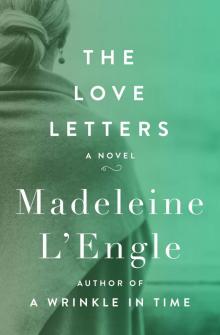 Love Letters
Love Letters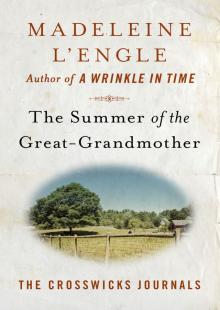 The Summer of the Great-Grandmother
The Summer of the Great-Grandmother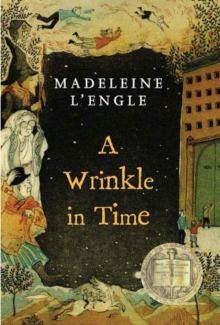 A Wrinkle in Time
A Wrinkle in Time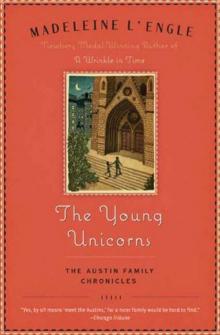 The Young Unicorns
The Young Unicorns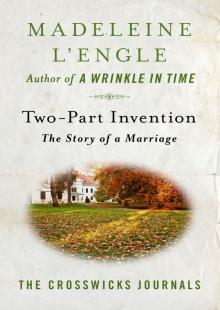 Two-Part Invention: The Story of a Marriage
Two-Part Invention: The Story of a Marriage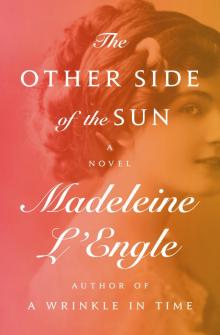 The Other Side of the Sun
The Other Side of the Sun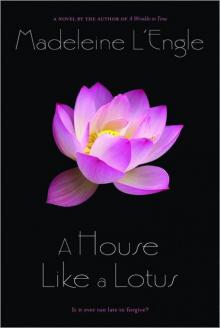 A House Like a Lotus
A House Like a Lotus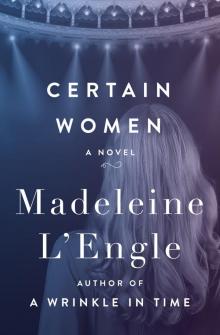 Certain Women
Certain Women Many Waters
Many Waters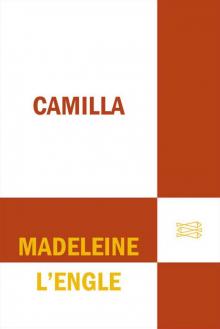 Camilla
Camilla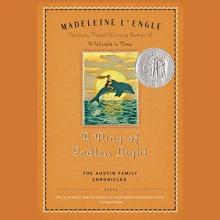 A Ring of Endless Light
A Ring of Endless Light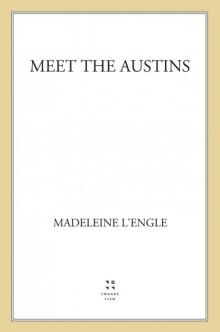 Meet the Austins
Meet the Austins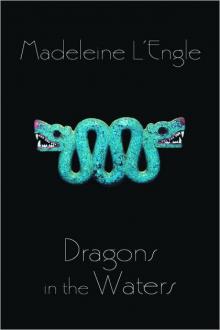 Dragons in the Waters
Dragons in the Waters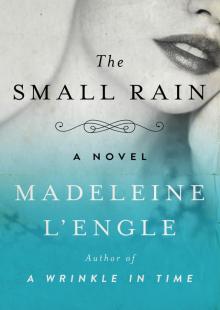 The Small Rain
The Small Rain The Moment of Tenderness
The Moment of Tenderness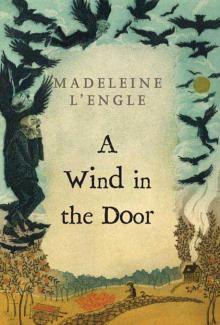 A Wind in the Door
A Wind in the Door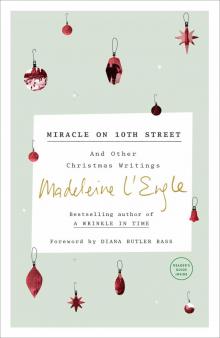 Miracle on 10th Street
Miracle on 10th Street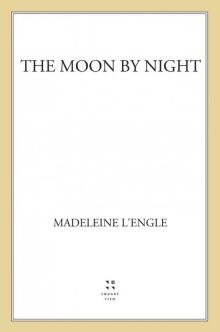 The Moon by Night
The Moon by Night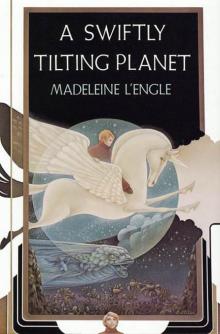 A Swiftly Tilting Planet
A Swiftly Tilting Planet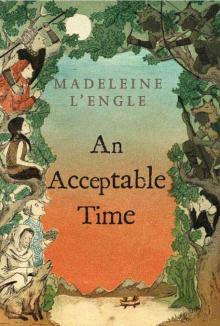 An Acceptable Time
An Acceptable Time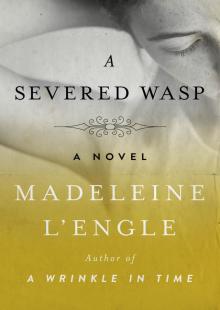 A Severed Wasp
A Severed Wasp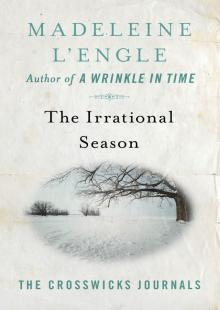 The Irrational Season
The Irrational Season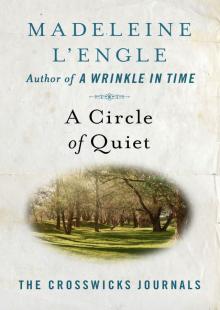 A Circle of Quiet
A Circle of Quiet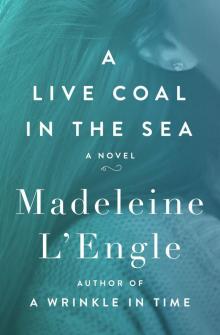 A Live Coal in the Sea
A Live Coal in the Sea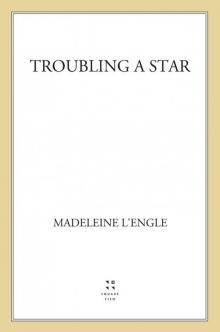 Troubling a Star
Troubling a Star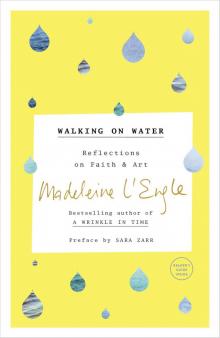 Walking on Water: Reflections on Faith and Art
Walking on Water: Reflections on Faith and Art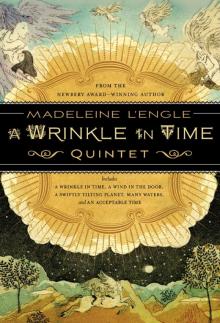 A Wrinkle in Time Quintet
A Wrinkle in Time Quintet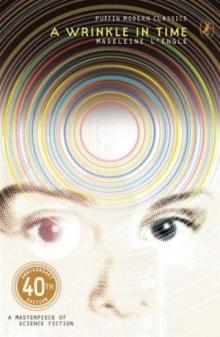 Wrinkle in Time
Wrinkle in Time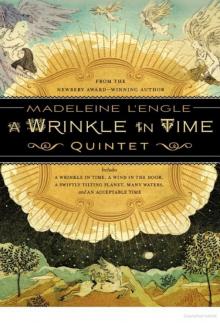 The Wrinkle in Time Quintet
The Wrinkle in Time Quintet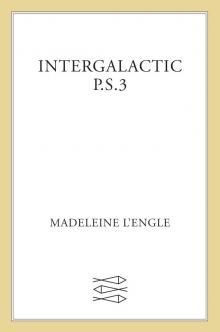 Intergalactic P.S. 3
Intergalactic P.S. 3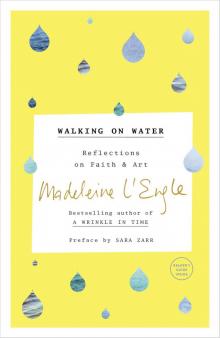 Walking on Water
Walking on Water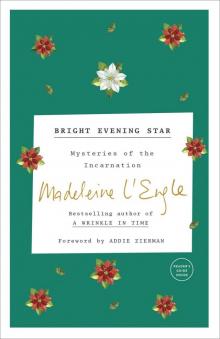 Bright Evening Star
Bright Evening Star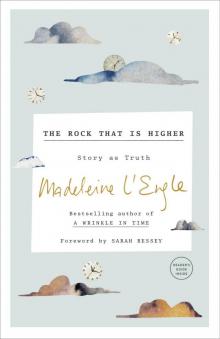 The Rock That Is Higher
The Rock That Is Higher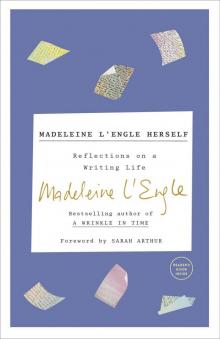 Madeleine L'Engle Herself
Madeleine L'Engle Herself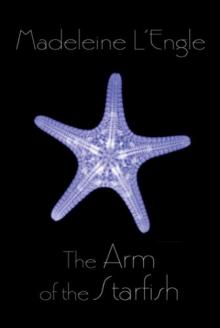 The Arm of the Starfish
The Arm of the Starfish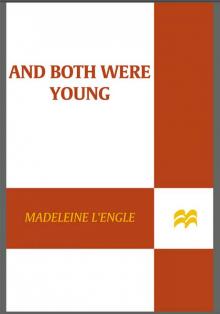 And Both Were Young
And Both Were Young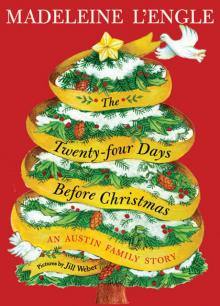 The Twenty-four Days Before Christmas
The Twenty-four Days Before Christmas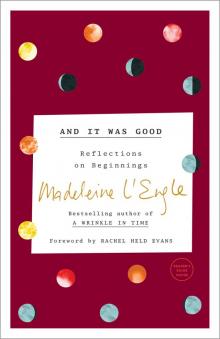 And It Was Good
And It Was Good A Stone for a Pillow
A Stone for a Pillow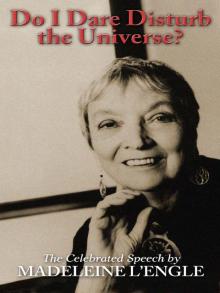 Do I Dare Disturb the Universe?
Do I Dare Disturb the Universe?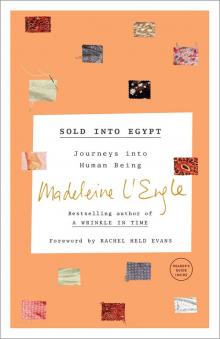 Sold into Egypt
Sold into Egypt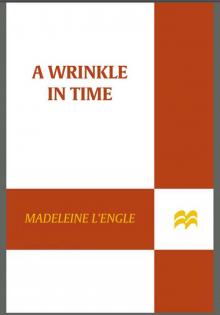 A Wrinkle in Time (Madeleine L'Engle's Time Quintet)
A Wrinkle in Time (Madeleine L'Engle's Time Quintet)